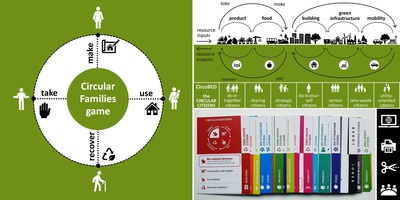Play Circular Families and Discover the Circular Citizens
Marchesi, Marianna (2022) Play Circular Families and Discover the Circular Citizens. In: Proceedings of Relating Systems Thinking and Design, RSD11, 3-16 Oct 2022, Brighton, United Kingdom.
Preview |
Text
Marchesi_Play_Paper_2022.pdf - Published Version Available under License Creative Commons Attribution Non-commercial No Derivatives. Download (793kB) | Preview |
![Marchesi_Image_2022.jpg [thumbnail of Marchesi_Image_2022.jpg]](https://openresearch.ocadu.ca/4229/1.hassmallThumbnailVersion/Marchesi_Image_2022.jpg)  Preview |
Image
Marchesi_Image_2022.jpg - Published Version Available under License Creative Commons Attribution Non-commercial No Derivatives. Download (399kB) | Preview |
Abstract
By 2050 cities across Europe aims to become fully circular by promoting a transition to a circular economy (CE) across urban sectors in collaboration with citizens, businesses and research. CE is a regenerative and restorative approach aiming at avoiding waste, extending product lifespans and regenerating natural systems enabling society, the economy and the environment to prosper sustainably. Until now, innovation for a CE has mainly focused on technological solutions with limited attention to social practices and behavioural change even though resource efficiency in cities is strongly connected to citizens’ behaviours.
This project explored how citizens can contribute to the transition to a CE in their cities and how they can be engaged. The proposed workshop aims to engage participants in a playful collaborative discovery on how they can take action for a CE in their cities.
The study analysed nearly 60 social innovation initiatives in cities which encourage citizens to change behaviour toward circular practices. Through deductive and inductive strategies by an “adapted version of the Grounded Theory approach” (Perry & Jensen, 2001), the study identified seven circular citizen types organized into communities, groups of interest, businesses, and social enterprises that implement different circular practices while aligning individual interests with social and environmental benefits (Marchesi & Tweed, 2021). Types are distinguished by different circular production or consumption practices and organized into three main motivation-focused categories. This taxonomy provides a systematic description of each type of circular citizen in terms of features, actions, challenges and impact (Marchesi, 2022).
Then, the study explored gamification as a method to facilitate citizens’ decoding of CE concepts and their engagement in taking action in their cities. The study applied the city gaming method Play the City (Tan, 2017) to develop a card game called Circular Families (Marchesi, 2022) (Fig. 1).
During a play session, each player aims to collect all 4 members from one of 13 ‘circular family’ groups that represent 5 urban sectors: construction, manufacturing, food, green infrastructure, and transport. To form a family, during each turn, players must decide on a circular action which could be ‘take’, ‘make’, ‘use’, or ‘recover’ to close the resource loop. Actions promote social innovation initiatives which engage in circular practices. After a game session, players can identify the circular citizen type they would like to become and discover features, actions, challenges and impacts.
| Item Type: | Conference/Workshop Item (Other) |
|---|---|
| Uncontrolled Keywords: | circular economy, circular society, social innovation, circular practices, gamification |
| Divisions: | Faculty of Design |
| Date Deposited: | 28 Mar 2024 16:16 |
| Last Modified: | 28 Mar 2024 16:16 |
| URI: | https://openresearch.ocadu.ca/id/eprint/4229 |
Actions (login required)
 |
Edit View |

 Tools
Tools Tools
Tools